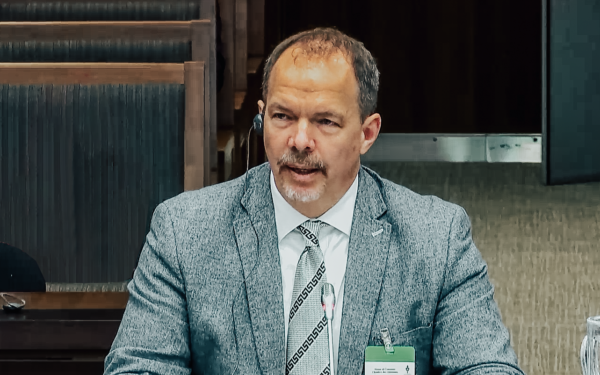This year’s 2021 Canadian Internet Governance Forum (IGF)—Canada’s leading multi-stakeholder forum for internet and digital policy issues—will take place throughout the year as a series of virtual events called Canadian IGF Talks.
The first session, Does the Government of Canada Still Support the Open Internet? took place on Tuesday, July 6 and was presented by CIRA, as part of its Community Investment Program.
Daniel Bernhard of FRIENDS of Canadian Broadcasting, Michael Geist of the University of Ottawa, Laura Tribe of OpenMedia, and Janet Yale, Chair of the Broadcasting and Telecommunications Legislative Review, debated the Canadian government’s 2021 digital policy agenda in a discussion moderated by CIRA president and CEO Byron Holland.
The panelists discussed how and when the Government of Canada ought to assert its sovereignty and jurisdiction with “Big Tech” companies, how best to support Canadian content and news media in the digital age, and the government’s commitment to the principles of the open internet.
Lots of the conversation centered around Bill C-10, An Act to Amend the Broadcasting Act, and the discrepancies between what was promised and intended by the government, and what has ended up in the bill. The “mismanaged” parliamentary process for Bill C-10 has led many experts and advocates to question the government’s support for the open internet and net neutrality.
Below you will find a link to the full video recording of the event, as well as an overview of the key takeaways from the first Canadian IGF Talks session:
Canadian IGF Talks: Does the Government of Canada Still Support the Open Internet?
1) While drafting laws to support Canadian content and news media, the government should begin with a clear picture of what they want Canada to look like at the end.
Bill C-10 and the proposals for how to support news media have begged the question: should support for news, arts, and culture rest on the continued growth of social media platforms? They also necessitate an examination of what and who the government is trying to support. Some panelists pointed out that while creating Bill C-10, digital-first creators were not consulted.
In addition, while discussing the viability of the Australian news model in Canada, Michael Geist noted that the model has only served to benefit a news media giant, Robert Murdoch. OpenMedia’s Laura Tribe stressed multiple times that the government should focus on fostering an environment for innovation and not simply focus on supporting large legacy players in the Canadian arts and news sectors.
2) In order to keep “Big Tech” responsible for the harms their platforms cause, the government should enforce existing laws.
FRIENDS of Canadian Broadcasting Executive Director Daniel Bernhard kicked off the discussion by stressing that the government should begin their fight against Big Tech by enforcing the laws Canada already has. This would be a more effective approach than trying to completely re-write the rules for the digital age, especially when a lot of what these companies do is not isolated to the internet.
Bernhard pointed out that there already laws on the books for many of the harms occurring on big platforms, like the sale of illegal drugs and child sexual abuse material. As well, there are existing tax laws that can compel the large digital companies “to pay their fair share.” Janet Yale urged that Canada needs to not be afraid to assert its jurisdiction while confronting these large global corporations.
However, panelists like Professor Geist pointed out that international companies can decide whether they wish to operate in countries with regulatory environments they find burdensome. He also noted that Canada should seriously consider how their policymaking may impact the business decisions of popular platforms, especially smaller niche platforms that don’t have the scale, resources, or technical ability to comply with strict regulations.
3) The government needs to go back to the drawing board to define key concepts and delineate between companies’ services and the companies themselves.
While discussing Bill C-10 and the government’s efforts to reign in the “web giants,” the panel largely agreed that the government has not clearly defined many key concepts for the digital age. For example, Bernhard pointed out that in Bill C-10 there is no definition of the “social media services” that it seeks to regulate.
Panelists also questioned whether the proposed policies were appropriately tailored. Several pointed out that the government has tried to paint Big Tech with a single brush to receive a political win simply for trying to stick up to them.
This over-simplification is problematic because of the diversity of services that Big Tech companies offer. A streaming service like Netflix should not have the same rules as a social network like Facebook or an online marketplace like Amazon. While some laws, like privacy and competition, can apply to all of them, there should be a more precise service-oriented approach to regulating in the digital economy.
Upcoming Canadian IGF Events
The Canadian IGF is Canada’s leading multi-stakeholder forum for internet and digital policy issues and is a National-Regional Initiative of the global IGF convened by the United Nations.
Upcoming Canadian IGF Talks events are currently being organized, with more expected in the fall. To stay up-to-date on upcoming announcements, follow the Canadian IGF on Facebook and Twitter and subscribe to our mailing list here.
Georgia is a Policy & Advocacy Analyst at CIRA and is very passionate about internet governance and digital policy.




